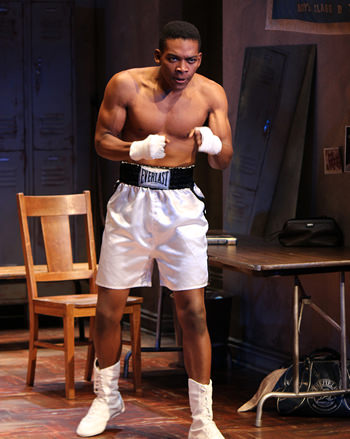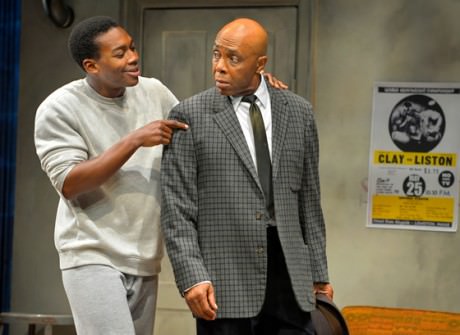How do two unlikely celebrities become friends?
Everyone has a public persona, but that persona is not necessarily their entire being. “I snuck in the back door,” Stepin Fetchit says sternly to Muhammad Ali, “so you could walk in the front.”

Round House Theatre, in a co-production with Marin Theatre Company, presents the DC area premiere of Will Power’s Fetch Clay, Make Man, an eye-opening, truth-based account about two drastically different cultural icons who fight to shape their legacies during the Civil Rights Movement. Directed by Derrick Sanders, this riveting production explores the unlikely friendship and improbable bond between a disgraced Hollywood actor and a heavyweight boxing champ who boldly embraced controversy.
Sanders embraces the material and runs with it – pushing the actors and the merits of this polished production to the fullest. His interpretation of Fetch Clay, Make Man is like a boxing flurry of a three-punch combination; he grabs the audience’s attention and comes at you from multiple directions with unrelenting immediacy and passion.
The direction immediately pulls you in with crafty staging and intriguing elements of the artistic design, engaging the audience with the material. Sanders has full grasp and understanding of the multiple storylines and has captured the raw essence and severity of those pivotal moments. There is so much going on. It’s a tumultuous time in the Civil Rights movement; tensions are high. Malcolm X was killed just a few months’ prior, Muhammad Ali is dealing with death threats, and his tested marriage has reached a turning point.
In May of 1965 in Lewistone, Maine at training camp, just days before the epic rematch between Muhammad Ali (Eddie Ray Jackson) and Sonny Liston, the 22-year-old Ali (the former Cassius Clay) and a new member of the Nation of Islam, arranges to meet American comedian and actor Stepin Fetchit (Roscoe Orman.) Ali knew that Fetchit and one-time heavy weight champ Jack Johnson were close friends and he wants to learn the secret of Johnson’s “anchor punch” to use on Liston in the upcoming fight. But Fetchit isn’t naive, quite the contrary. He wants something too. Stepin Fetchit wants to revitalize his career and redeem his public image through being associated with the champ.
In Fetch Clay, Make Man we see a shifting America where Muhammad Ali and Stepin Fetchit are seen as polar opposites. Ali is in his prime and Fetchit is “in his renaissance,” says Ali. Yet the two unlikely paragons and Masters of creating their controversial personal images soon became a burgeoning friendship; Ali makes Fetchit his “Special Strategist.”
Stepin Fetchit. The name itself is derogatory. “People think I’m the man’s boy, but nothing is farther from the truth,” says Fetchit. With wry humor, Roscoe Orman, best known as Sesame Street’s Gordon (the third actor to play that role, from 1974 to the present), is Stepin Fetchit. Fetchit is a veteran entertainer struggling to survive in a dog-eat-dog world.
The persona of Stepin Fetchit very little resembled the man, whose real name was Lincoln Perry. Vilified for playing degrading stereotypes of black men, Stepin Fetchit was the first black actor to receive a screen credit and the first to become a millionaire. But little could convenience the world that the popular Golden Age of Hollywood actor was any different from the mumbling, lazy, and shiftless stereotypes that he portrayed.
The playwright makes the case that, Stepin Fetchit was too good at the lie. “When you wear the mask for so long, you can’t take it off,” says Fetchit. The play suggests that while Fetchit became associated with racial prejudice, Muhammad Ali is the symbol of black pride.
“I’m the prettiest. I’m the fastest. I’m the greatest,” says Ali. Muhammad Ali was black, loud, and proud. Ali joined the Nation of Islam after the first Sonny Liston fight and refused to fight in the Vietnam War. As such, the confident, fast-talking, bragging boxer outraged people all across the country.
Coming of age in a time of transition, maintaining dignity and a strong sense of self didn’t come easily.
Identity is part of the human condition. As some point we’ve all struggled with whom we are and how we are perceived. Fetch Clay, Make Man has race politics on its mind but at its heart this knockout of a story is about identity. Learning about the complexities of Stepin Fetchit and Muhammad Ali is a reflection of the complexity of black people.
Will Power has created an impressive and fascinating narrative based on the little known happenings leading up to a legendary moment in boxing history. With a rhythmic style, the complex, layered text is precise and smartly written. Flashback scenes illuminate the first act establishing the background and understanding of Stepin Fetchit’s plight. Continuing into the second act the flashbacks are less effective, feeling unnecessary and slightly slowed the dramatic tension leading up to fight night.
Most impressive is how Power creates a compelling drama of not only the two main characters, “Step” and Ali, but of all five characters in Fetch Man, Make Clay. All of the characters are fully realized, three-dimensional personalities who interestingly have revealing monologues in this play.
Roscoe Orman is amazing embodying the role of Stepin Fetchit. What he does on stage is a Master class performance. Orman’s range is delicious. He succeeds at what every great actor accomplishes: with craft and intelligence; he’s created a multifaceted character with an emotional trajectory that you care about. Orman has taken Power’s words and devoured them creating a believable world of Stepin Fetchit where you indeed see the man beyond the caricature.
He shines in speaking Fetchit’s truth when he encounters confrontations with the other four characters. When Fetchit details the mysteries of Jack Johnson and the “anchor punch,” I felt the blows. I felt the struggle and the rage of his ancestors. Orman is phenomenal.
Eddie Ray Jackson does an excellent portrayal of Muhammad Ali and maintaining his energetic personality – especially with his mischievous, playful side. Jackson looks nothing like Ali but he doesn’t need to because he captures Ali’s infectious spirit, confidence, and physicality. Besides he has the cadence of Ali’s speech delivery down that is a constant nod-shaking reminder of the champ.
Jefferson A. Russell is a force whenever he sets a foot on the stage. Russell was last seen at Round House Theatre in his spectacular performance as Memphis in Two Trains Running. In Fetch Clay, Make Man he plays the role of Brother Rashid, an Ali bodyguard provided by the Nation of Islam, who regards Fetchit as “the white man’s flunky – a traitor to the black man.” Russell is pitch-perfect on how he emphasizes Stepin FETCHIT’s last name and handles him with controlled disdain.
Katherine Renee Turin delivers an exquisite Sonji, Muhammad Ali’s wife, who is a determined young woman who loves her man and who knows who she is. She’s smart, she’s sexy, and she’s a woman of Islam – a rare portrayal seen in the theatre today.
The cast is rounded out with the strong performance of Robert Sicular as William Fox. His moments with the Stepin Fetchit character in the flashback scenes provide context illustrating the challenges and demands of the Hollywood Studio System.
The cohesive vision of the artistic design and Courtney O’Neill’s set maximizes the simplicity of the training room and the flashbacks. The important pieces that add to the authenticity of the scenes are never so overpowering that they steal the focus from the character-driven narrative being told. Colin K. Bills and Christopher Baine’s lighting and sound designs highlight and complement pivotal emotional moments, and Heidi Leigh Hanson’s costume design – especially Sonji’s colorful dresswear – is fantastic.
Caite Hevner Kemp’s projections are vital in the potent visual storytelling of Fetch Clay, Make Man and the thoughtful curation of the photographs and imagery is magnificent. The dramatic flair of framing the center stage above and on the two sides is seamlessly used in the powerful transitional moments and flashbacks. I won’t soon forget that towing Jack Johnson image.
Playwright, Will Power has something to say, and he reveals it in this 1965 moment between Stepin Fetchit and Muhammad Ali with emotional resonance and conviction. This mighty Round House Theatre production delivers a wallop of entertainment and insight into the personal journeys of two of America’s cultural definers of race and provocation.
Fetch Clay, Make Man is a story of depth, passion, and lessons to be learned about the complexities of identity and humanity that encourage audiences to go back into history with a more nuanced, sophisticated eye. History serves not only to recall the important events of our time; it serves to teach us lessons to be learned from the mistakes of the past. Fetch Clay, Make Man will leave you interested in searching for more answers and perhaps wondering what other pages of our history books are missing.

Who was Stepin Fetchit? Who is Cassius Clay/Muhammad Ali? Looking back at yesterday can better help us understand our world today.
Running Time: Two hours and 15 minutes, including one 15-minute intermission
Fetch Clay, Make Man plays through November 2, 2014 at Round House Theatre – 4545 East-West Highway, in Bethesda, MD. For tickets, call the box office at (240) 644-1100, or purchase them online.




